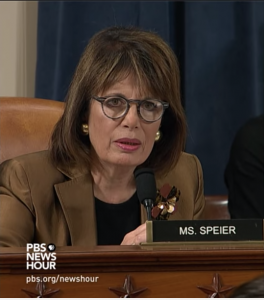
Senator Hannah-Beth Jackson. (Kevin Sanders for California Globe)
Product Price Gender Discrimination Would Be Made Illegal Under New Bill
SB 873 would remove the ‘pink tax’ from many products marketed to women
By Evan Symon, February 19, 2020 1:22 pm
A new bill that would prohibit businesses from charging more for products targeted towards women was given a push by bill supporters in Sacramento on Tuesday.
A new against the ‘pink tax’
Senate Bill 873, authored by Senator Hannah-Beth Jackson (D-Santa Barbara), specifically calls for an end to higher prices for female-oriented products when similar products for men are priced differently, such as in deodorants, hair products, toys, and dental products. The bill also makes it clear that this isn’t municipal or county based, but rather covered over the entire state.
“With women earning less on average than their male peers and frequently paying more for the same products, they face an unjust tax for being female,” announced Senator Jackson in a press release. “A dollar here, a dollar there, it all adds up. The ‘pink tax’ is unfair, unethical, and harms women and families everywhere. When women are held back financially, we all suffer.”

“One’s personal success and economic well being should not be determined by their gender,” added Jackson at a later press conference. “Women in California earn an estimated 88 cents for every dollar a man makes. For women of color, it’s even less, but when you look at the 88 cent number, we know that the pay gap adds up to more than $7,000 per year.”
The bill also argues with evidence from a study by the New York City Department of Consumer Affairs that found that out of 800 products with both male and female variants that 50% of female-oriented products cost more than the same product marketed to men.
SB 873 would be an expansion of the Gender Tax Repeal Act, a 1995 law that banned gender price discrimination for services similar to those of men, such as dry cleaning and gym fees. The 1995 act was written b then Assemblywoman and current Congresswoman Jackie Speier (D-CA), who has joined Jackson with her support in adding to the law. Speier herself has also tried to pass a similar ‘pink tax’ bill in Congress for several years but so far to no success.
Many consumer groups and women’s organizations, as well as Senators from both parties, have come out in favor of SB 873.
Possible opposition to SB 873
While there is no formed opposition to the bill, many of the consumer businesses affected may be lobbying hard against the bill.
“That’s what they have done in Washington or in Sacramento,” said Eileen McNamara, a consumer analyst. “Jackson tried this last year with SB 320, and it wasn’t even close to getting to the Governor’s desk because of problem’s with allowing for ‘civil actions’ regarding this. Just imagine the lawsuits.”
“And Speier has tried and failed to get this passed in Washington so many times, but it keeps falling because of reluctance from industries and because there are claims of added ingredients and variants to different products.”
“Jackson has done a good job in narrowing it down and making it more palatable for passage, like saying how product color isn’t a substantial difference, like blue clothes for boys and pink clothes for girls. But many of the differences go deeper than that, and it needs to be specific so it doesn’t leave a lot open for interpretation or leave an easy loophole open for companies, or they will use it and we’ll be seeing bills over the next several years plugging up all the holes left open.”
SB 873 has been referred to three Senate Committees and is expected to be heard in the different Committees starting next month.
- Bill to Require Law Enforcement Disclosure if AI Was Used To Help Write Reports - August 7, 2025
- Gov. Newsom Files FOIA Request To ‘Expose True Cost’ Of L.A. Federal Troop Deployment for Anti-ICE Riots - August 6, 2025
- California Redistricting: How Newsom’s Plan Will Demolish Hard Fought GOP Gains - August 6, 2025





Communism at its finest.
“such as in deodorants, hair products, toys, and dental products”. Why can’t women just buy the stuff marketed to guys if they want price equity. Everybody is equal, right? Problem solved.
You took the words right out of my mouth. Exactly